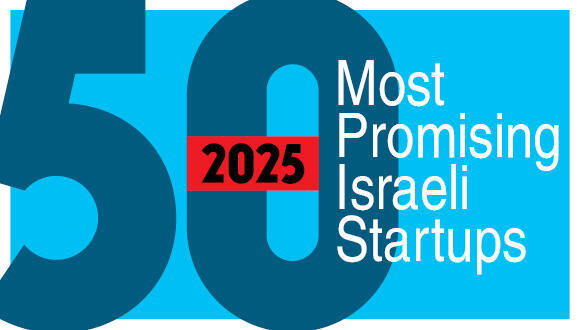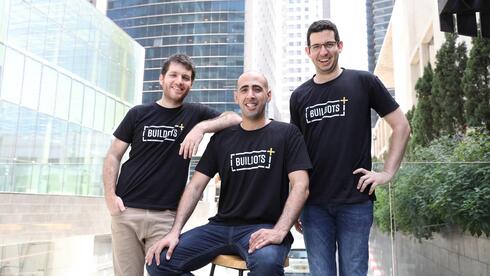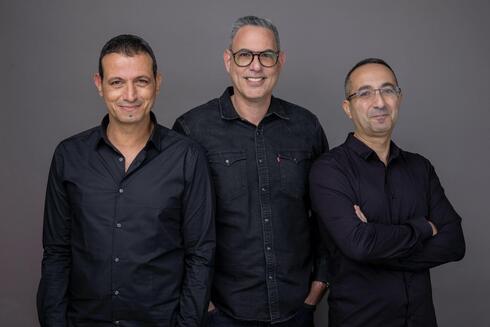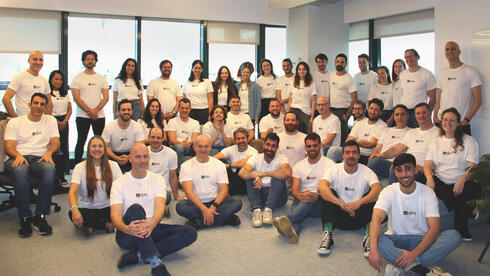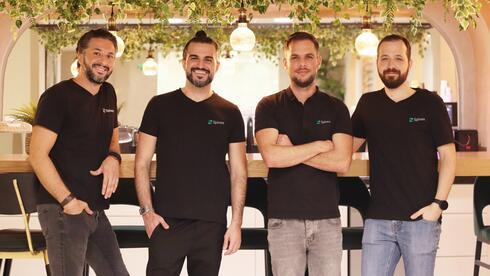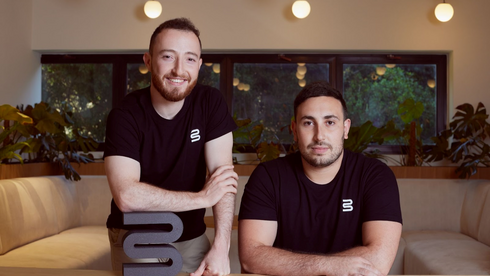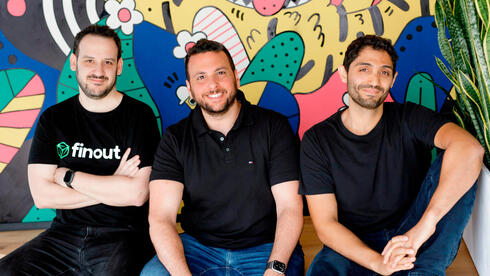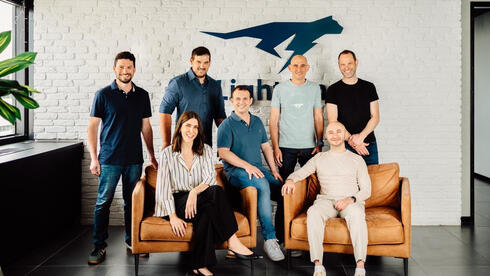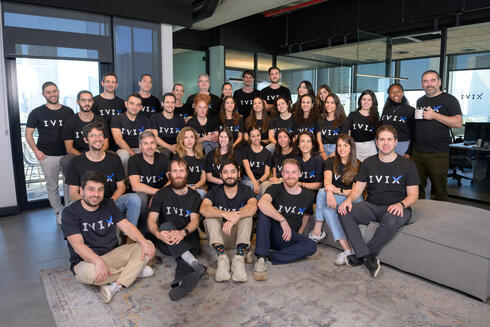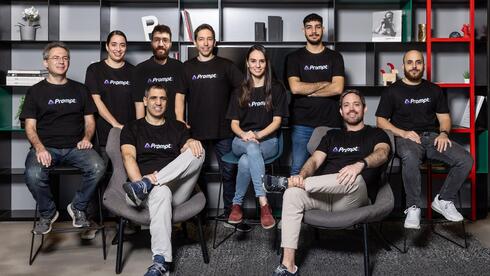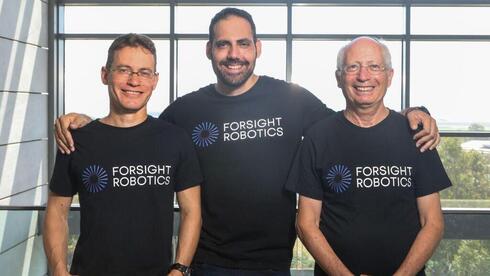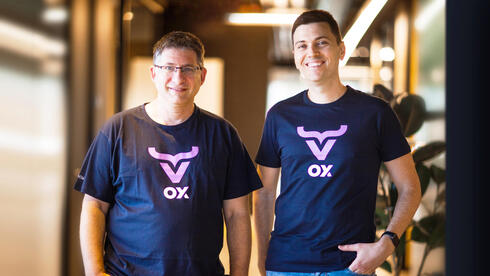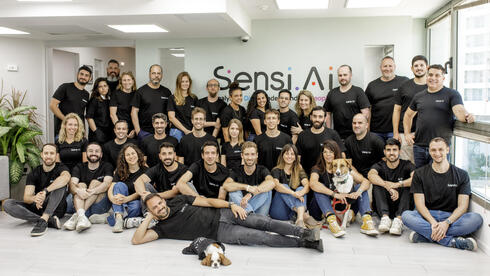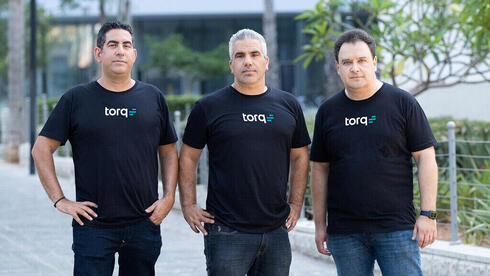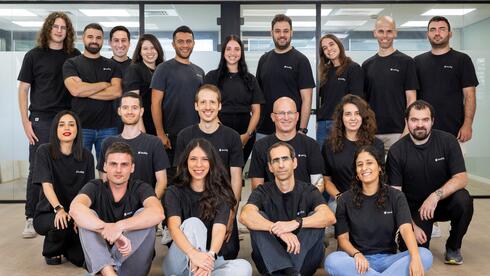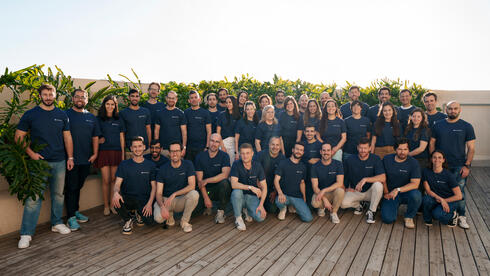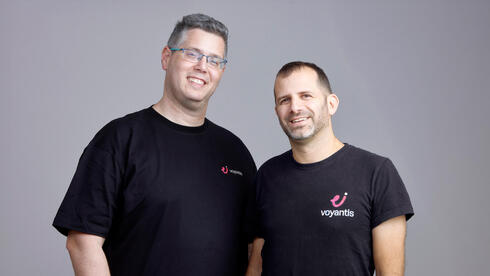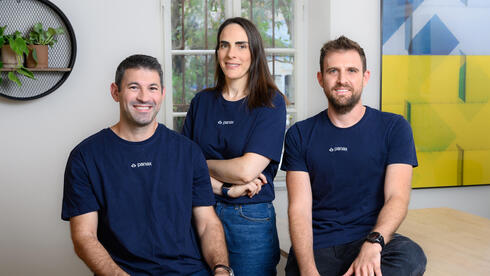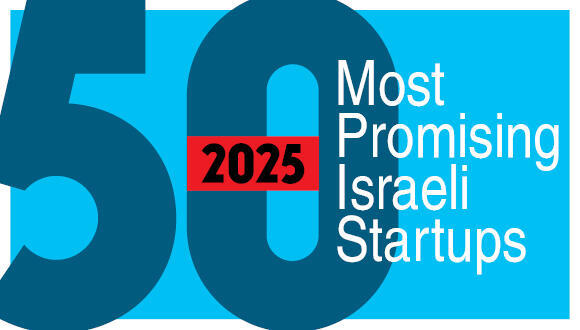
Top 50 Startups List
The 50 most promising Israeli startups - 2025
Now in its 16th year, Calcalist's Top 50 list spotlights Israel's most promising private tech companies—selected with input from leading investors, consultants, and entrepreneurs, and curated by the publication's expert editors.
Amid war, political unrest, and growing global economic uncertainty, Israeli startups are not just surviving — they are reshaping the future. In 2025, Israel’s tech ecosystem remains one of the world’s most resilient and inventive, producing startups that are tackling some of the era’s most urgent challenges: securing the AI revolution, driving clean energy innovation, and reimagining healthcare, finance, and defense.
The turmoil at home and abroad has fundamentally changed the rules for emerging companies. Today’s most promising Israeli startups are less focused on growth at any cost and more determined to build sustainable, defensible businesses from day one. Deep tech, AI security, climate resilience, and real-world profitability have replaced the unicorn dreams of the past decade.
Top 50 Israeli startups - 2024 edition
Top 50 Israeli startups - 2023 edition
Top 50 Israeli startups - 2022 edition
Top 50 Israeli startups - 2021 edition
Top 50 Israeli startups - 2020 edition
Top 50 Israeli startups - 2019 edition
This year’s list of the 50 most promising Israeli startups captures a sector in the midst of reinvention — more mature, more mission-driven, and arguably more essential than ever. Despite the uncertainty surrounding them, these companies offer a glimpse of a different future: one powered by ambition, grounded in necessity, and driven by a nation that has made innovation its most enduring export.
1. Decart
Sector: AI | Established: 2023 | Founders: Dr. Dean Leitersdorf and Moshe Shalev | Employees: 50 | Funding: $53 million from Sequoia, Benchmark, Zeev Ventures
On one of the walls in the hallway of Decart's Tel Aviv offices hangs a blurry photograph of a girl. Printed on an A4 sheet with a standard office printer, the photo might go unnoticed—except for its significance to Decart’s founders, Dean Leitersdorf and Moshe Shalev. For them, the girl in the photo, known only as Sarah, serves as a kind of red flag—a daily reminder of why they are building their startup.
“Sarah is one of the world’s most elite and successful early-stage investors, with a strong track record in backing startups that became giants,” explain Leitersdorf and Shalev. “When we raised our Seed round in August, we spoke with ten funds. Half said, ‘This is amazing. I’ve never heard of anything like it. Take the money.’ The other half said, ‘We’re sure you’ll succeed technically, but we don’t understand what the final product is, so we’ll pass.’ Sarah was the only one who said she didn’t think we could even pull off the technology. She told us Israelis don’t know how to train models and that Israel has already missed the generative AI train. Her photo is on the wall as a reminder—we have to prove her wrong.”
The mission the two have set for themselves is, by their own admission, nothing short of revolutionary.
Read the full interview with the Decart co-founders
2. Quantum Machines
Sector: Quantum Computing | Established: 2018 | Founders: Dr. Yonatan Cohen, Dr. Itamar Sivan, and Dr. Nissim Ofek | Employees: 180 employees, half of them in Tel Aviv and the rest in Denmark, Germany, Japan and the US | Funding: $280 million from PSG Equity, Red Dot Capital, Intel Capital, TLV Partners, Meron capital, and Avigdor Willenz
"Humanity must not receive such enormous power all at once—it will destroy itself," warns Dr. Itamar Sivan, CEO of Israeli startup Quantum Machines, one of the world’s leading companies in the field of quantum computing.
While global investment in quantum computing has soared into the billions—and the technology is no longer a far-off theory—Israel has joined the race with a national quantum initiative and the first domestic quantum computer built at Tel Aviv University. At the heart of this effort is Quantum Machines, co-founded by three PhDs from the Weizmann Institute, each a respected expert in the field. Quantum Machines was ranked in second position in Calcalist’s list of Israel’s top 50 most promising startups of 2025.
"We’ve been in quantum computing for many years, coming from academia," says Sivan. “The three of us earned doctorates at the Weizmann Institute, and for years the field was seen as something that might happen in 20 years—or never. But near the end of our doctoral work, we saw it was actually happening, thanks to breakthroughs like the first demonstration of quantum bit correction—done by one of our founders in 2016. We realized that quantum computing was transitioning from theory to industry, and that its tremendous computing power could soon be realized.”
Read the full interview with Quantum Machines CEO Dr. Itamar Sivan
3. Buildots
Sector: Construction process management | Established: 2018 | Founders: Roy Danon, Aviv Leibovici and Yakir Sudry | Employees: 200, 150 of them in Israel | Funding: $121 million from TLV Partners, Lightspeed, Intel Capital, Maor, O.G. Venture Partners, Viola Ventures, Tidhar, Avigdor Willenz, Ziv Aviram
Buildots was built the way entrepreneurs are always advised to build: start with the problem, not the solution. That principle is often cited as a cure for one of the startup world’s chronic illnesses—falling in love with a flashy idea that solves a problem no one actually feels. The founders of Buildots, ranked number three in Calcalist’s top 50 most promising Israeli startups of 2025, picked a problem that is all too real: delays in construction projects.
Most of us know the pain from the buyer’s side in residential real estate. But in commercial construction, the consequences of delays can be even more expensive. Buildots co-founders Roy Danon, Yakir Sudry, and Aviv Leibovici first met through Israel’s elite Talpiot military program and remained close throughout their years in tech units. Each year, they’d go skiing and talk about the startup they would one day launch. After a decade in uniform, they sat down and finally did it.
Read the full story on Buildots
4. Fetcherr
Sector: AI for Business | Established: 2018 | Founders: Roy Cohen, Dr. Uri Yerushalmi, Robby Nissan | Employees: 170, 100 in Israel and the rest in the US and Poland | Funding: $116 million from Battery Ventures, Lanet, Livermore, M-fund, Left Lane
The story of Fetcherr stands out from most of the startups featured in this year's list of the 50 most promising companies. Its founders didn’t meet during military service or while working at the same tech company, as is often the case in Israel’s startup ecosystem—but rather on the way to kindergarten with their children.
Today, those children are just about to be drafted into the army. Back in 2019, the three fathers launched a different kind of baby: a company developing AI-based forecasting tools for businesses. Roy Cohen, Dr. Uri Yerushalmi, and Robby Nissan used to have long conversations about artificial intelligence—before it entered the mainstream—while sitting in a playground in Netanya’s Poleg neighborhood. That’s still where the company is headquartered, despite having already raised $120 million and being more than capable of affording offices in Tel Aviv.
Read the full story on Fetcherr
5. qbiq
Sector: Real estate | Established: 2019 | Founders: Leeor Solnik, Elad Kaminer, Noam Diamantstein, Roey Granot | Employees: Headquartered in Tel Aviv, with offices in New York, London and Miami, Qbiq employs 65 people, 50 of whom are in Israel | Funding: $16 million from Insight Partners, JLL Spark, 10D, Ocean Azul, Random Forest, M-Fund
Israeli startup qbiq, which develops a platform for automated architectural design, is making inroads into the traditionally conservative real estate sector—an industry often resistant to technological disruption. In just two and a half years, qbiq's platform has generated architectural plans for approximately 50 million square meters (over half a billion square feet), equivalent to the size of about 1,000 high-rise buildings. This scale is unprecedented for a young tech company operating in real estate, where adoption of innovation typically occurs at a glacial pace.
The company currently serves around 2,000 users across more than 60 countries, including approximately 150 of the world’s leading real estate firms—many of which are notoriously slow to adopt new tools. Qbiq focuses on the early-stage planning of commercial real estate, a high-investment sector with significant business potential. However, the company plans to expand into residential planning as well. To meet growing demand, qbiq is opening a new office in London. The 50 million square meter milestone is only the beginning—the company expects to surpass one billion square feet of planned space early next year.
What sets qbiq apart is its ability to deliver a complete architectural design package within just 24 hours—a process that typically takes traditional architecture firms 6 to 8 weeks. The platform generates multiple design alternatives, comprehensive planning documents with cost estimates, high-resolution 3D simulations for virtual tours, and performance analysis of each option. Importantly, it requires no prior architectural knowledge from users. The system also allows for the redesign of existing structures. In just a few years, qbiq has proven that there is significant market demand for fast, automated design solutions.
The main challenge facing the real estate industry today is the slow, manual nature of architectural design—a process that has remained largely unchanged for 40 years, since the introduction of software like Autodesk. Today, property potential is often assessed manually by architects, creating a bottleneck that impedes scalability. Qbiq addresses this pain point with a technological solution in a domain that was once considered impossible to automate. During its first year of sales in 2019, qbiq reported revenue six times higher than the industry average, underscoring the strong demand for its solution.
Qbiq’s customers include major international players such as Brookfield Properties, JLL, and Skanska, as well as top Israeli real estate firms including Maven, Azrieli Group, and Israel Canada. The company's rapid growth and broad adoption point to the vast potential of its technology to reshape the future of real estate planning.
6. Kela
Sector: Defense Tech | Established: 2024 | Founders: Hamutal Meridor, Alon Dror, Jason Manne, Omer Bar-Ilan | Employees: 25 | Funding: $39 million from Sequoia, LUX
Anyone who thinks that high-tech is a glamorous profession is invited to talk to Hamutal Meridor. Several months ago, she found herself running through the center of Kyiv, heading toward a train station to seek shelter from the sounds of explosions in all directions, with no prior warning. What was she doing in Kyiv? As the founder of Kela, a startup emerging as one of the hottest players in the global defense tech sector (not just in Israel), she was on a business trip with Alon Dror, the company's co-founder and CEO. When you run a company that develops military systems, your beta site is often a battlefield.
"It was important for us to travel to Ukraine to understand what a battlefield outside Israel looks like, so that we wouldn’t build our systems solely for Israel," Meridor explains in a special interview with Calcalist. "It was a learning trip, and I was surprised by how many people we managed to meet there. In the end, they’re like us—living amidst war, and a culture of engineering and weapons development is emerging there as well. Quite a few malls that were once filled with brand-name stores have been converted into weapons factories. But unlike Israel, in Ukraine, you see the war everywhere. Even in the center of Kyiv, there are buildings with holes in them, something we aren’t used to seeing. There are no sirens either. Suddenly, we saw people running toward a train station, and we realized that Russian drones, made in Iran, were coming. By then, explosions were already happening all around us."
Read the full interview with Kela co-founder Hamutal Meridor
7. Spines
Sector: Publishing | Established: 2021 | Founders: Lev David, Yehuda Niv, Niv Ovdat, Nir Kenner | Employees: 100| Funding: $22.5 million from Zeev Ventures, Aleph, M-Fund, LionTree, and angel investors including Sharin Fisher Dibrov
The story of the Spines platform is, in many ways, the personal story of its founder, Yehuda Niv. Niv’s journey—from an electrical engineer with a passion for books to the founder of a groundbreaking company aiming to revolutionize a traditional industry—illustrates how a personal challenge can spark wide-reaching innovation.
The turning point came when Niv, then pursuing a master’s degree in electrical engineering at Ben-Gurion University, published a novel he had written while still a soldier. The thriller, titled Silent Thunder, was not particularly successful by his own account, but the experience exposed him to the cumbersome bureaucracy and numerous inefficiencies involved in the publishing process. This insight led him to found Niv Books in 2013, which has since grown to become Israel’s most prolific publishing house.
Since launching Spines, growth has been meteoric. In 2023, the company grew its revenue by 1,000%, and it repeated that performance again in 2024.
Read the full interview with Spines
8. Blockaid
Sector: Crypto Security | Established: 2022 | Founders: Ido Ben-Natan, Raz Niv | Employees: Unknown | Funding: $50 million from Ribbit Capital, Variant, Cyberstarts
Israeli cybersecurity company Blockaid is establishing itself as a pioneer in the field of digital asset security in the crypto world, amid a growing wave of massive fraud. Founded in 2022 by Ido Ben-Natan and Raz Niv, two Unit 8200 veterans with extensive experience in security research and winners of the Israel Security Award, the company has developed a security platform designed to protect end users, infrastructure, and digital assets from fraud and attacks.
The need for advanced security solutions in the crypto space has never been more critical. The meteoric growth of the blockchain market, coupled with the vast sums of money flowing into it, has attracted malicious actors equipped with increasingly advanced technologies, including artificial intelligence. According to data, over $1.4 billion was stolen from end users in 2024 alone, in addition to hundreds of millions of dollars lost in attacks on infrastructure companies. These alarming figures are undermining market confidence and threatening the sector’s continued growth.
Recognizing the urgent need for a comprehensive response to these challenges, Blockaid developed a unified platform that enables continuous monitoring, accurate detection, and automated response to attempted fraud and attacks. Over the past year, the company’s platform has scanned more than 2.4 billion transactions and 787 million interactions with decentralized applications (dApps). Blockaid’s unique ability to analyze and secure vast amounts of data in real time has proven highly effective, with the company identifying and blocking over 71 million attack attempts—preventing losses estimated at over $5.3 billion out of a total of more than $101 billion in protected assets.
Recognition of Blockaid’s potential is reflected in a series of impressive funding rounds. The company has raised $83 million to date, including a $50 million round led by Ribbit Capital, with participation from existing investors such as Variant and Cyberstarts. This round followed a successful Series A in October 2023, when Blockaid raised $27 million, led by the same investors along with Greylock and Sequoia. These funding achievements, secured just a year after emerging from stealth mode, demonstrate investors’ strong confidence in the founding team, the technology, and the company's critical role in securing the future of digital assets.
CEO Ido Ben-Natan, who grew up in Silicon Valley and returned to Israel at 16, says the idea to launch Blockaid with Raz Niv—whom he met during their service in the Prime Minister’s Office—was born during their military careers. Both have a deep background in ciphers and cryptography and recognized the unique and unsolved security challenges facing the blockchain world. Reflecting on the magnitude of the threat, Ben-Natan notes: “The amount of money lost and the threat to this world is mind-boggling, and there is no category comparable to this in the cyber world.”
9. Agora
Sector: Real estate investment management | Established: 2019 | Founders: Bar Mor, Lior Dolinski, Noam Kahan | Employees: 170 | Funding: $63 million from Qumra Capital, Insight Partners, Fusion, Aleph
Israeli fintech company Agora, which has developed an innovative platform for managing real estate investments, is growing even as the American real estate market, where it primarily operates, slows. Founded by three Unit 8200 alumni—Bar Mor (CEO), Lior Dolinski (CPO), and Noam Kahan (CTO)—the company has raised a total of $63 million to date, reflecting strong investor confidence. Agora currently employs 170 people across its development and marketing centers in Tel Aviv and New York, further evidence of its rapid growth.
The past year marked a turning point for Agora, during which it successfully doubled the size of its operations. According to Mor, the company generated revenues in the tens of millions of dollars and has set an ambitious goal of reaching $100 million in revenue in the near future.
One of Agora's key growth drivers is its continued expansion in the U.S., its primary target market. The company is significantly increasing its operations there, now employing over 40 people. In addition, Agora is expanding internationally, with operations in Australia and Latin America, and is focusing on high-growth regions such as Canada, Austin, and Miami, where it is opening additional branches. The addition of major clients such as The Kushner Company highlights the platform’s growing attractiveness and the value it provides.
Agora continues to invest heavily in the development and enhancement of its core product—a real estate investment management platform. At the same time, it offers a range of complementary products in areas such as taxation, account management, and payments, while implementing integrations with external systems to provide a comprehensive solution for its clients.
In a short time, Agora has recruited over 1,000 clients, who collectively manage assets totaling over $300 billion, encompassing approximately 70,000 investors using the platform. The company identifies three major growth engines for the future: continued client acquisition, ongoing investment in product innovation to maintain its market leadership, and a strategic focus on the payments and accounting sectors, where it sees significant growth opportunities.
Agora offers a complete solution for managing cash flows between real estate companies and investors—covering everything from calculating amounts due to each investor, producing detailed reports, to executing the actual transfers. The company also sees substantial business opportunities in this area, including collecting commissions on money transfers and foreign exchange conversions, as well as earning profits from interest on funds held within its system. The commission service is already operational, and Agora plans to expand its activity in the interest revenue area later this year.
Despite the current challenges in the U.S. real estate market, stemming largely from rising interest rates, Agora continues to post impressive growth. According to the company, this resilience reflects both the high quality and value of its platform, and the growing market need for efficient solutions for managing real estate investments. Agora believes that when the market returns to a positive growth trajectory, it will be exceptionally well-positioned to accelerate its expansion even further.
10. Finout
Sector: Cloud resource management | Established: 2021 | Founders: Asaf Liveanu, Roi Ravhon, Yizhar Gilboa | Employees: 100 | Funding: $85 million from Insight Partners, Team8, Pitango, Red Dot, Jibe, Maor, J-Ventures
Everyone loves to talk about technological developments related to the cloud and artificial intelligence and how they are transforming work processes. What people like to discuss less is how much all of this is costing organizations—especially at a time when cloud spending has become the second-largest budget expense for many companies, particularly in the high-tech sector.
The people purchasing these services are typically software teams, but the ones paying for them are the finance departments—and meetings between the two sides do not always end well. Disagreements over what is truly necessary, what the appropriate budget should be, and who holds responsibility for this critical resource have led organizations to create a new function: Finops (Financial Operations) specialists, bridging finance and operations. These professionals are tasked with mediating and translating the development teams' needs for finance departments.
As more companies move to multi-cloud environments—working with several cloud providers simultaneously—some organizations are also creating roles such as Cloud Resource Planner, dedicated to optimizing cloud usage. Israeli company Finout is selling solutions to address precisely these needs, aiming to reduce the headaches and make cloud expense management more automated.
Finout’s ambition is to become the Salesforce of the Finops field—the software platform everyone uses to control cloud expenses and manage related processes. Although the company was founded only in 2021, it has already raised $85 million in four funding rounds from top-tier investors including Insight Partners, Red Dot Capital Partners, and Team8.
The broader market also shows that Finout’s opportunity is real. Several of its early competitors have been acquired by large corporations, sometimes to their detriment. CloudHealth was acquired by VMware, which was later sold to Broadcom. Similarly, Cloudability was sold to Apptio, which was later acquired by IBM. While these deals validate the market demand for cloud expense management solutions, they have also led to competing platforms being absorbed into tech giants that may not prioritize further innovation in the space—leaving room for an independent player like Finout to thrive.
Finout was founded by Roy Rabhon (CEO), Yizhar Gilboa (Chief Technology Officer), and Assaf Livano (Chief Product Officer). Rabhon and Gilboa met in the elite programming course of the IDF's ICT Corps, while Livano joined later after meeting them during their time working together at another Israeli startup, Logz.io. Throughout both their military service and their subsequent careers in the private sector, the three founders faced growing complexities in cloud management—a challenge that only intensified with the rise of AI-driven functions.
Today, Finout boasts an impressive list of clients, including the New York Times, the ride-hailing company Lyft, and Israeli cybersecurity unicorn Wiz. The company is expanding rapidly, with plans to double its workforce by the end of 2025.
11. Lightrun
Sector: Observability | Founders: Ilan Peleg, Leonid Blouvshein | Funding: $110 million from Insight Partners, Accel, Citi, Glilot Capital Partners
Lightrun is in the right place at the right time, offering technology that nearly every software development company needs.
Lightrun’s AI-powered Autonomous Remediation Platform is emerging as the go-to solution for fully automated code fixes, streamlining the remediation process from ticket to resolution. By shifting from reactive observability to proactive, real-time remediation, Lightrun enables engineering teams to detect, diagnose, and resolve runtime issues in minutes instead of days. In the GenAI era, where software delivery is accelerating, this evolution is critical, placing operational reliability front and center for CIOs once code reaches production. While automation has advanced areas like code generation, QA, and testing, there is a growing gap in production resilience. Lightrun bridges this gap with autonomous, AI-driven remediation.
"Today, it is very easy to develop software and move quickly, but any bug can lead to disaster," explains Ilan Peleg, the company's founder and CEO.
The recent major malfunction at cybersecurity company CrowdStrike has made it clear to organizations that they cannot afford errors in their software. At the same time, the pressure to rapidly develop AI-based tools remains extremely strong.
Recognizing the opportunity, two leading investment funds, Accel and Insight Partners, led a $70 million funding round for Lightrun earlier this week.
The year 2024 marked a major turning point for the company, with a 4.5x jump in revenue and record demand from large global organizations, particularly within the financial sector, including some of the world’s largest F10 giants and banks.
12. Zafran
Sector: Cyber | Established: 2022 | Founders: Sanaz Yashar, Ben Seri, Snir Havdala | Employees: 100, half in Israel and the US | Funding: $70 million from Sequoia, CERCA, CyberStarts, the David Fisher Foundation, Penny Jar
In 2022, Zafran entered a very crowded field within the cybersecurity world: identifying weaknesses in corporate security systems. All the major players—from Palo Alto and CrowdStrike to Microsoft and Cisco—are already active in this niche. But the young Israeli startup is betting on two central advantages: its independence from any broad security platform, making it a kind of "Switzerland" in the industry, and the identities of its founders.
Sanaz Yashar, Ben Seri, and Snir Havdala—all three cybersecurity experts with experience on both the defensive and offensive sides—grew up in Israel’s elite intelligence units. The most famous of them is CEO Sanaz Yashar, who was born in Tehran and immigrated to Israel as a child. She is partly the inspiration behind the spy series Tehran. Yashar served for 15 years in Unit 8200, rising to the rank of Major, and later led cyber threat research and analysis teams at FireEye (which was later acquired by Google subsidiary Mandiant). She took part in major geopolitical investigations, including the probe into the cyberattack on a major Israeli hospital, where she collaborated with Seri and Havdala.
Havdala, the company's Chief Product Officer, is a graduate of the Air Force’s prestigious "Talpiot" program and spent about a decade in Unit 8200, where he was awarded both the Israel Security Award and the Chief of Staff's Technology Medal. He began his service on a team led by Yinon Costica, one of the four co-founders of Wiz, and was discharged with the rank of Major. Seri, Zafran’s CTO, also won the Israel Security Award during his service in Unit 81.
The trio’s expertise results in what could be described as the "cyber Iron Dome" for organizations. Zafran’s platform operates automatically, connects to all of an organization’s existing security tools—on average, U.S. companies use about 75 different security products that do not always communicate with each other—and maps vulnerabilities across the network. After analysis, it highlights weak points that could serve as entry targets for attackers and gradually neutralizes the risk.
A key advantage of Zafran’s solution is that it operates without installing an agent, meaning that attackers have no indication the platform is running on the network, and therefore cannot disable it.
Zafran secured its first customer contract just five months after its founding. There is already considerable buzz in the cybersecurity industry that Zafran has received multiple acquisition offers, but the company has so far declined, believing it has the potential to grow much larger.
13. IVIX
Sector: Fintech | Established: 2020 | Founders: Matan Fattal, Doron Passov | Employees: 50, the majority in Israel | Funding: $23 million from Team8, Insight Partners, Cardumen, Citi Ventures
"The story of the fintech company IVIX begins in Batya Kindergarten in Ra'anana, where the founders Matan Fattal and Doron Passov met, and continued their studies in high school, during which the two completed a bachelor's degree in mathematics.
The idea for IVIX was born after a meeting with a chief of a financial crime enforcement agency. Fattal and Passov left the meeting amazed when they discovered that enforcement authorities around the world often have very limited technological tools for tracking the shadow economy, terrorist financing, and money laundering.
After three years of building a financial index of the internet, towards the end of 2023, IVIX began selling the product it built - a graph of financial connections from public data and AI capabilities to crack financial crimes. The system can also trace shell companies and crypto wallets, and since it began selling the product to government and law enforcement agencies, its revenues have skyrocketed. IVIX plans to collect 10%-15% of the amounts it manages to recover, and has already identified several billion dollars in unreported capital.
14. Prompt Security
Sector: AI Security | Established: 2023 | Founders: Itamar Golan, Lior Drihem | Employees: 35 | Funding: $23 million from Jump Capital, Hetz Ventures, Ridge Ventures, Okta, F5
One of Israeli cybersecurity firm Prompt Security’s biggest competitors, Protect AI, has been sold to Palo Alto Networks for hundreds of millions of dollars—a deal that marks Generative Artificial Intelligence (GenAI) security as one of the hottest areas in the cybersecurity market. So far, Prompt Security has raised $23 million.
Prompt Security was founded in August 2023 by two alumni of Unit 8200, Itamar Golan, who serves as the company's CEO, and Lior Drihem, who serves as CTO. Both founders have deep expertise in cybersecurity and artificial intelligence. Golan has an impressive track record, having established AI divisions at leading cyber companies Check Point and Orca Security, while Drihem previously served as Director of Innovation at Check Point and worked closely with Golan at Orca.
Prompt Security’s platform is designed to enable organizations to safely adopt generative AI tools, addressing a wide range of potential risks. The company’s unique solution thoroughly examines every point of contact between AI tools and an organization's environment. This includes a rigorous analysis of tools used by employees, such as browsers and coding assistants, various GenAI integrations, as well as internal applications developed in-house. The platform monitors and examines every prompt and response of AI models, with the aim of preventing the exposure of sensitive data, blocking harmful content, and protecting against attacks specific to generative AI environments.
CEO Itamar Golan expressed strong optimism about both the company's future and the broader market, noting that AI security has become a recognized, urgent need—similar to how the importance of cloud security became widely acknowledged in previous years. According to Golan, Prompt Security has seen significant growth in transaction volume and customer base, including major companies worldwide. He compared Prompt’s potential in AI security to what companies like Wiz and Orca achieved in the cloud security space.
Golan estimates that reaching $50 million in revenue is a near-term target for Prompt Security, especially as the impending acquisition of a major competitor has raised Prompt’s profile and market standing. Golan emphasized that he does not view Prompt as a target for acquisition at this stage, but rather envisions it becoming the leading independent company in the GenAI security sector.
15. Grain
Sector: Fintech | Established: 2022 | Founders: Dor Golan, Aharon Navon, Michal Beinisch, Nir Galon | Employees: 30 | Funding: $51 million from Bain Capital Ventures, Vesey Ventures, Aleph, Hanaco Ventures
The Israeli fintech company Grain is not a typical fintech startup—it was founded by executives from the financial industry without formal technology backgrounds. Nevertheless, the growth it has achieved since its founding in 2022 is impressive. Grain offers a platform for streamlining and managing risks in international foreign exchange (forex) transactions. It has developed a solution primarily designed for trading and tourism platforms, payment providers, and account management software companies that execute a high volume of forex transactions in short periods.
Grain’s vision is to leverage transaction-level data analysis to offer customized hedging solutions—something typically unavailable to small and medium-sized businesses through traditional banks. In an increasingly globalized world marked by geopolitical and economic instability, the need for effective foreign exchange risk management is growing rapidly for businesses of all sizes. Grain connects to global platforms and systems with cross-border operations, enabling them to offer their clients protection against currency fluctuations in an automated and efficient way.
Grain’s leadership team brings deep expertise in financial markets and fintech innovation. CEO and Co-Founder Dor Golan was previously the managing partner of Blue Orca Capital and co-founder of crypto liquidity firm Horizon. CBO and Co-Founder Aharon Navon formerly led Barclays CEEMEA FX and rates trading. COO and Co-Founder Michal Beinisch served as COO of Barclays Israel and Global Head of Rise, Barclays’ fintech innovation platform, while CPO Nir Galon held product leadership roles at fintech startups Melio, Bluevine, and Rewire. This unique combination of financial expertise and technological understanding has been the foundation of the company’s early success.
Grain’s rapid growth is reflected in the volume of transactions processed through its platform, which already exceeds $1 billion per year. Recognition of the company's potential in the global fintech market is evident in significant funding rounds, with Grain raising over $50 million since its inception.
With a team of 32 employees and a growing revenue base, Grain aims to reach $100 million in sales within three years. The company is focused on deepening its presence across various segments of the vast global foreign exchange market and exploring expansion into additional areas of risk management, such as interest rate and inflation hedging. Thanks to its innovative technology, experienced leadership team, and strong financial backing, Grain is positioning itself as a major force in the global fintech industry, with significant potential for long-term impact.
16. ForSight Robotics
Sector: Medical robotics | Established: 2020 | Founders: Prof. Moshe Shoham, Dr. Daniel Glozman, Dr. Joseph Nathan | Employees: 105 | Funding: $67 million from Eclipse Ventures, Mithril Capital, Dr. Fred Moll, Israel Innovation Authority
Based in Yokneam, ForSight Robotics is emerging as a major force in the world of eye surgery. With a small but growing team of 105 employees, this Israeli company—led by CEO Dr. Daniel Glozman, Chief Scientific Professor Moshe Shoham, and President and Chief Medical Officer Dr. Joseph Nathan—aims to revolutionize the field and address the global shortage of skilled eye surgeons.
The uniqueness of ForSight Robotics lies in its combination of microsurgical robotics, computer imaging, and machine learning.
Behind the company stands a wealth of experience and deep expertise in medical robotics. Dr. Fred Moll and Rony Abovitz, members of Forsight’s strategic board of directors, along with co-founder Prof. Shoham, are among the founding fathers of some of the world’s most successful medical robotics companies, including Intuitive Surgical (maker of the da Vinci surgical robot), Mako Surgical, and Mazor Robotics. The company’s clinical advisory board features leading figures in the field of ophthalmology, such as Dr. David Chang and Prof. Boris Malyugin, highlighting the high level of trust in ForSight’s innovative technology.
The need for ForSight Robotics’ solution is growing rapidly. Timely microsurgical eye procedures can prevent blindness, but they require an exceptionally high level of skill—leading to a severe global shortage of qualified surgeons. In developed countries, there are an average of 72 eye surgeons per million people; in developing countries, the figure drops to just 3.7. It is estimated that around 2.2 billion people worldwide suffer from preventable vision impairment, resulting in trillions of dollars in lost productivity and treatment costs every year.
Dr. Joseph Nathan, one of the company’s founders, explains the motivation behind ForSight Robotics: "As an ophthalmologist and an engineer, I understood that technology was needed to improve the level of surgery and bridge the huge gap caused by the shortage of doctors." The collaboration with Prof. Moshe Shoham, a pioneer in medical robotics and founder of Mazor Robotics, and Dr. Daniel Glozman, who has extensive industry experience, led to the founding of ForSight Robotics five years ago.
The company's robotic platform has already undergone three generations of development and is designed to perform all types of eye surgeries. Its first focus will be on cataract surgery, a condition affecting around 600 million people worldwide, while only about 30 million procedures are performed annually. With the aging global population and rising rates of diabetes and obesity, the demand for surgeries is expected to surge even as the number of available ophthalmologists declines. "There is no human way to bridge this gap," emphasizes Dr. Nathan. "We are developing a platform that provides 10 times the accuracy of the human hand, and accuracy here is critical."
ForSight Robotics' ambitions extend beyond improving surgical accuracy and efficiency. The company ultimately aims to integrate artificial intelligence into its platform to fully automate surgeries under human supervision. "Laser vision correction works in a similar way," notes Dr. Nathan.
While the long-term goal is to become a dominant player in the field, a future sale is not ruled out. Dr. Nathan believes that if ForSight reaches the commercialization stage following FDA approval, it could achieve a record-breaking valuation—and possibly become the largest medical device exit in Israeli history.
17. OX Security
Sector: Cyber | Established: 2021 | Founders: Neatsun Ziv, Lior Arzi | Employees: 150, of which 80 in Israel and the US | Funding: $38 million from Team8, Microsoft, IBM, Evolution
This is probably one of the great growth stories of Israeli cyber—an environment already crowded with hyper-growth startups. OX Security didn’t invent its field, enterprise application security, but it benefits from two unique advantages: first, most of its competitors have been acquired in recent years; second, it approached the market with a different solution strategy that has made it stand out.
Part of the reason for OX’s distinctiveness lies in the backgrounds of its two founders, who have been living and breathing cybersecurity for many years. Neatsun Ziv and Lior Arzi both served in Unit 8200 before working for an extended period at Check Point. Ziv, the 44-year-old CEO, joined Check Point after it acquired his previous startup, Vanadium, in 2011. He stayed at Check Point for a decade, ultimately managing a division as VP of Threat Prevention & Intelligence. Arzi, who serves as Chief Product Officer at OX, was previously Director of Endpoint and Mobile at Check Point. Today, a significant number of OX’s employees are also former Check Point veterans, with the rest largely drawn from Unit 8200.
In 2021, Ziv and Arzi left Check Point to found OX Security. At first, the company competed with startups like Cider Security, Enzo, and Bionic—until each of those was acquired in 2023 by Palo Alto Networks, Snyk, and CrowdStrike, respectively, each in deals valued at several hundred million dollars.
OX’s unique approach in a crowded landscape is its focus on alerting customers only to the critical risks—those few that could cause the most devastating damage during the application development and distribution process. This approach was crystallized following the SolarWinds hack around the time of OX’s founding. While traditional competitors flooded customers with long lists of vulnerabilities, OX adopted a different philosophy: 95% of threats are relatively insignificant, so the company would only flag the 5% that could truly "kill" a business.
Investors embraced the idea enthusiastically. In 2022, OX emerged from stealth with one of the largest Seed funding rounds in Israeli cybersecurity history, raising $34 million. The company's solution has also proven itself in the market. Although OX only began selling its product in 2023, it now boasts hundreds of paying customers.
18. Sensi.ai
Sector: Healthtech | Established: 2020 | Founders: Romi Gubes, Nevo Elmalem, Alon Brener | Employees: 90 | Funding: $53 million from Zeev Ventures, Insight Partners, Entrée Capital, Flint Capital, Jibe Ventures, Secret Chord Ventures
In the vast technological world, it is often from deeply personal experiences that groundbreaking solutions emerge. This is exactly how Sensi was born—a company founded out of the personal trauma of its Israeli founder, a software engineer who experienced a shocking event involving her daughter in kindergarten about twelve years ago. The trauma, which left a lasting scar, eventually inspired her to apply her technological skills to protect vulnerable populations.
While Sensi’s original mission was to create solutions for children, the founder soon recognized the enormous opportunities in senior care, driven by a deep understanding of the urgent need for technology to improve the lives of older adults.
Founded at the end of 2019, Sensi was built on the insight that most elderly people prefer to age at home, in familiar and safe environments. However, the reality is more complex. Studies show that many home care agencies struggle to keep up with the growing demand for services, in part due to a chronic workforce shortage. This is where Sensi’s innovative solution steps in—bringing transparency, safety, and efficiency to the world of home care.
Sensi’s technology is based on artificial intelligence-powered audio systems, installed in seniors’ homes to monitor conditions in real time. These systems analyze voice data to detect emergencies, early clinical signs such as urinary tract infections or pneumonia, and even severe loneliness—a major challenge among the elderly. Years of accumulated data have helped Sensi achieve particularly high levels of performance.
The recognition of Sensi’s potential is reflected in an impressive $53 million raised across three funding rounds, the latest led by major investors including Insight Partners and Oren Zeev. Today, Sensi’s technology operates in the homes of tens of thousands of seniors across 44 U.S. states, and the company has tripled in size since entering the market. Its systems now log approximately 15 million interactions per day, offering caregivers and families a rich and detailed picture of a patient's well-being.
One case highlights the power of Sensi’s technology: an elderly woman frequently fell at home, but her family couldn’t understand why. After installing Sensi, it became clear that her wake-up routine had shifted—she was rising earlier, likely feeling unwell, and trying to call for help, leading to falls. Once caregivers adjusted their schedules to align with her new routine, the falls stopped completely.
In another instance, a woman who had recently fallen had Sensi installed. The system detected that she was experiencing shortness of breath at night—likely a result of untreated pneumonia—and dizziness during the day. Based on these findings, her care team discovered that a medication side effect was exacerbating her condition. Adjusting her treatment significantly improved her health and prevented further falls.
Sensi’s ultimate mission is clear: to reduce hospitalization rates and allow seniors to age safely and independently at home. Its technology provides round-the-clock monitoring and identifies needs that seniors themselves often cannot express, serving as a vital communication bridge between the elderly, caregivers, and family members.
Already generating tens of millions of dollars in sales, Sensi aims to maintain its high growth rate. Future plans include developing a system that will automatically generate personalized care plans and expanding its collaboration with home care agencies, which collectively serve about 20 million seniors in the U.S. These agencies are Sensi’s main customers, and their caregivers use the system to offer seniors 24/7 safety in their homes.
With 90 employees and three offices—a development center in Israel and branches in Austin and Palo Alto—Sensi is laser-focused on the massive and growing American market. The company plans to leverage its vast data pool to build a fully automated CRM system for its clients and eventually move into the insurer market by securing insurance coverage for its technology. By 2027, Sensi aims to expand beyond senior care into new markets.
Sensi’s journey, born from personal hardship, is a testament to how technological innovation, compassion, and a deep understanding of human needs can create meaningful change in the world.
19. Torq
Sector: Cyber | Established: 2020 | Founders: Ofer Smadari, Leonid Belkind, Eldad Livni | Employees: 250, Israel and the US | Funding: $190 million from Evolution Equity Partners, Bessemer Venture Partners, Notable Capital Greenfield Partners, Strait Capital, Gili Raanan, Assaf Rappaport, Nadir Yizrael, Yevgeny Dibrov, Tomer Schwartz, Sharin Fisher Dibrov
Israeli cybersecurity company Torq, formerly known as StackPulse, was valued at approximately $600 million in its latest funding round, with several prominent figures in the Israeli cyber industry among its investors. Over the past year, Torq has reported around 300% growth in its customer base, which now includes major names across various industries such as Blackstone, Carvana, Deepwatch, Nubank, Riskified, Rivian, Telefonica, and ZoomInfo. This success reflects the significant value Torq’s platform delivers to its customers and strengthens its position in an increasingly competitive market.
The company, which operates out of Israel and manages its sales primarily in the United States, began significant commercial activity in January 2022. Since then, its growth trajectory has accelerated sharply: from a few million dollars in sales in 2023 to $7.5 million, then rising to $20 million in 2024, with expectations of reaching $45 million in 2025.
Ofer Smadari, the company's CEO, expressed strong confidence in Torq’s future, noting that the company is well-positioned to capture substantial market share. Torq competes primarily against established giants like Palo Alto Networks and Splunk—and, according to Smadari, manages to replace them in more than 70% of transactions.
Torq’s technology provides organizations with greater autonomy in managing their cybersecurity operations. The platform collects security events from a wide range of sources, verifies their authenticity using automation and artificial intelligence, and remediates incidents almost entirely autonomously.
Looking ahead, Torq expects to reach $100 million in sales by 2026 and achieve breakeven. However, given its impressive growth rate and the market opportunities ahead, the company may choose to raise additional capital to accelerate its expansion.
20. Upwind Security
Sector: Cloud Security | Established: 2022 | Founders: Amiram Shachar, Liran Polak, Tal Zur, Lavi Ferdman | Employees: 150 | Funding: $180 million from Penny Jar, Swish, Craft Ventures, TCV, Alta Park Capital, Leaders, Greylock, Cyberstarts
Israeli startup Upwind, founded in 2022 by Amiram Shachar, along with his founding partners from Spot.io (which was sold to NetApp for $450 million): Liran Polak, Lavi Ferdman, and Tal Zuri—has been around for less than three years and was already valued at $850–900 million in its latest funding round.
Upwind’s success is rooted in its founders’ extensive experience in cloud security and their deep understanding of market needs. After selling Spot.io, the founders identified a significant gap: the need for a comprehensive and innovative security platform adapted to the DevOps era and focused on the runtime security of cloud applications.
Upon its founding in late 2022, Upwind quickly raised $30 million from Cyberstarts and Greylock. Initially, the vision was to focus on a specific area of cloud security, but it soon became clear that the market demanded a broader, more holistic platform. As a result, the company launched an additional $50 million funding round, bringing its valuation to approximately $300 million—a significant jump from its Seed stage.
The year 2024 marked a turning point for Upwind, with rapid sales growth. Today, the company employs approximately 200 people across Israel, the United States, Iceland, and the United Kingdom. The decision to expand to Iceland stemmed from the acquisition of Spot.io, which had operated in the country, as well as the identification of high-level cloud infrastructure talent there.
Regarding competition, Upwind sees Wiz as its main rival. CEO Amiram Shachar estimates that within four years, the cloud security market will consolidate around four major players: Palo Alto Networks, CrowdStrike, Wiz, and Upwind—where he hopes to position his company as the fourth leader. According to Shachar, the key to success is speed in bringing new products to market, an area where Upwind is demonstrating impressive performance. The company plans to generate $30 million in sales this year and is already competing in many deals alongside its larger competitors.
21. Zenity
Sector: AI Cyber | Established: 2021 | Founders: Ben Kliger, Michael Bargury | Employees: 90, 60% in Israel and the rest in the USA | Funding: $55 million from TPV, DTCP, Microsoft, M12, Intel Capital, Vertex Ventures, UpWest
Zenity is part of a new generation of companies that may finally put Israel on the global AI map—through the lens of cybersecurity. Although the company was founded before ChatGPT and its peers entered the public consciousness, its two founders, both Microsoft veterans, were already attuned to the emerging world of co-pilots and the no-code revolution they triggered. This trend—development with minimal human involvement—opens organizations up to a completely new set of risks.
As Zenity CEO and co-founder Ben Kliger recently put it: “The most beautiful thing about AI agents is that they don’t need us—the humans. They connect to data, make decisions autonomously. So attackers are no longer targeting employees, but the AI working on their behalf.”
Kliger and his co-founder, Michael Bargury, left Microsoft in 2021, just before the artificial intelligence boom. The wave that followed only heightened the urgency and relevance of their work. In November 2023, Microsoft officially launched its CoPilot product. Just one week later, Zenity released its own platform.
Zenity made headlines in the global cybersecurity community in 2024, when Bargury presented research at the Black Hat conference showing how easy it is to compromise corporate copilots—including Microsoft’s. Zenity’s research also found that the average large enterprise operates nearly 80,000 AI agents, applications, and automations built using low-code platforms—and more than 62% of them contain some kind of security vulnerability.
The core of the risk lies in who holds the power: business users. Increasingly, these users—not developers—are building and customizing AI agents and copilots. That means they determine the agents’ behavior, data connections, automated actions, identity roles, and access privileges, including those granted to external users. In the AI age, attackers can exploit this surface through methods such as command injection, data poisoning, and hidden prompts targeting inherently “curious” AI systems.
Since launching its product, Zenity has grown at a rapid clip. In the past six months alone, the company has expanded from 55 to 90 employees and plans to continue hiring—especially on the sales side, where demand remains strong despite the company initially targeting only Fortune 1000 clients.
22. Qodo
Sector: AI for developers | Established: 2022 | Founders: Itamar Friedman, Dedy Kredo | Employees: 80 | Funding: $50 million from Susa Ventures and Square Peg, Firestreak Ventures, ICON Continuity Fund
Startup Qodo, founded in 2022 by entrepreneurs Itamar Friedman and Dedy Kredo, is on a rapid growth trajectory, propelled by the surge in AI-assisted software development. The company has developed an innovative AI-based platform designed to improve code quality through automated writing and testing. To date, Qodo has raised $50 million in funding.
Qodo’s vision is shaped by the unique challenges emerging from the widespread use of AI tools in software development. While these tools accelerate the pace of coding, they don’t always ensure that the resulting code is error-free or aligned with developer intent. Qodo’s platform addresses this gap by validating that each line of code matches the programmer’s original logic—creating a new category focused on code intent validation in an age of AI-generated software.
The need for such a solution is especially acute among fast-growing startups and tech companies that prioritize both speed and safety. These organizations use Qodo to uphold high standards of code quality as they scale. The company’s customer roster already includes Walmart, Intuit, Cisco, and monday.com.
In just two and a half years, Qodo has grown rapidly and now employs 80 people. It has completed two funding rounds, raising $10 million in its Seed round and an additional $40 million in its Series A. The company's performance metrics are equally compelling—it doubled its achievements in a single quarter compared to the same period the previous year, and expects this momentum to continue.
To support its fast expansion, Qodo recently hired the former Snyk sales manager and is significantly scaling its sales organization while continuing to invest in product development. The company anticipates substantial growth in 2026 and beyond, with an ambitious product roadmap that could help define the emerging standard for quality assurance in the AI era.
23. Anecdotes
Sector: Cyber | Established: 2020 | Founders: Yair Kuznitsov, Roi Amior | Employees: 100, 60 in Israel and the rest in the US | Funding: $85 million from Glilot Capital Partners, DTCP, Red Dot Capital Partners, Vertex Ventures, Vintage Investment Partners, Aleph
Anecdotes operates in a field that may seem boring but is absolutely critical for modern organizations. As cyberattacks grow more frequent and sophisticated, regulatory requirements for cybersecurity preparedness, incident reporting, and breach remediation are increasing in parallel. Yet despite the urgency, the governance, risk management, and compliance (GRC) space remains fragmented and manual—sometimes even relying on screenshots sent to accounting firms for audit purposes.
That’s where Anecdotes comes in. The Israeli startup has developed a platform that integrates with existing organizational systems and automatically gathers the data needed for compliance, streamlining GRC processes and making them more accurate, transparent, and audit-ready. The company is already serving clients across three core sectors: technology, financial services, and healthcare. It works in partnership with leading global consulting firms, including the Big Four accounting firms, and with enterprise platforms like ServiceNow. Its customers include high-profile names like Snowflake, SoFi, and Well Health.
Anecdotes was founded by Yair Kuznitsov (34) and Roy Amior (40), both veterans of Unit 8200, though they didn’t serve at the same time. They met later at Intsights, another Israeli startup focused on cyber threat intelligence. During their time there, they were struck by the outdated and manual nature of audit and compliance workflows—even in forward-thinking companies—and decided to build a solution that would automate the entire GRC reporting process.
Their platform connects to tools like AWS, Snowflake, and other enterprise systems, continuously collecting compliance-related data. When needed, it generates reports required by regulators, simplifying the complex audit process. It took about four years to develop the product, but once it launched, demand surged.
One indication of Anecdotes' momentum is its recent capital raise. In late 2023, the German investment firm DTCP made a small initial investment, with an agreement to follow up if Anecdotes met aggressive sales targets. In April 2025, after hitting those goals, the company raised an additional $30 million, building on a previous $25 million round.
While Anecdotes currently focuses on high-growth industries, the long-term addressable market is vast—virtually every organization globally faces GRC challenges. The market includes many legacy business intelligence providers generating billions in revenue with largely manual and disconnected processes. Anecdotes doesn’t aim to replace these systems entirely, but rather to integrate with them, helping organizations close information gaps and meet increasingly stringent regulatory demands with far less friction.
24. Voyantis
Sector: AI Marketing | Established: 2020 | Founders: Ido Wiesenberg, Eran Friendinger | Employees: 70 Israel and the United States | Funding: $60 million from Intel Capital. Square Peg, Target Global, Jibe, Redseed, Alicorn, ICON
Israeli startup Voyantis, founded by Ido Wiesenberg and Eran Friendinger, has been on an impressive growth trajectory over the past year and is emerging as a key player in the field of AI-powered marketing platforms. The company has developed a solution that significantly streamlines customer acquisition processes and improves long-term retention by predicting the future value of each customer.
The company’s potential is underscored by the $60 million it has raised since its inception in 2020. Voyantis was founded by serial entrepreneurs with a proven track record: Wiesenberg, the CEO, previously co-founded Tvinci, which was acquired by Kaltura; Friendinger, the CTO, co-founded Adience, which was sold to Market Tech.
Today, Voyantis employs around 70 people, most of whom are based in Israel, with the rest located in the United States, Mexico, and Europe. Its platform is used by leading global companies including Miro, Rappi, HoneyBook, Natural Intelligence, and MoneyLion.
Voyantis' momentum is reflected in its business performance. The company has met or exceeded its targets for five consecutive quarters and recorded a threefold increase in revenue in the first quarter of this year compared to the same period in 2024. It expects to close 2025 with revenue three times higher than the previous year.
The company’s AI platform allows businesses to predict Customer Lifetime Value (CLV), enabling more strategic decisions about user acquisition and retention. The platform helps companies attract higher-value users via advertising platforms such as Facebook and Google, and recently expanded its offering to support customer retention and increase lifetime value. This focus on CLV has led to larger deal sizes and growing demand.
Voyantis serves a broad range of industries—from consumer apps and fintech to marketplaces, courier services, and cloud platforms. Its rapid rise has drawn industry attention: a major U.S.-based competitor in the space was recently acquired at a high revenue multiple, signaling strong market validation for Voyantis’ approach.
25. Panax
Sector: AI-driven cash management | Established: 2022 | Founders: Noam Mills, Sefi Itzkovich, Niv Yaar | Employees: 32 employees, the majority in Israel, opened in New York last year | Funding: $15 million from TLV Partners, Team8
If Noam Mills' face looks familiar, it’s probably not from the high-tech world. Mills, one of the co-founders of Panax, is a former Olympic fencer who represented Israel at the 2008 Beijing Olympics. But a lot has changed since then. Over the years, she completed two degrees at Harvard University, worked at Boston Consulting Group and at Ishay Davidi’s FIMI investment fund, and also served as CFO at a startup.
Throughout these experiences, she repeatedly encountered a challenge that would eventually inspire her to start a company: cash flow management. It was a recurring issue across FIMI’s portfolio companies—many of which come from traditional industries but operate alongside high-tech firms. Managing cash flow and forecasting was especially difficult for small and medium-sized businesses, and the problem was further complicated when operating across international markets in multiple currencies.
The tools available were mostly enterprise-grade—large, expensive systems tailored for big corporations—leaving smaller firms to rely on manual processes and spreadsheets that often failed to present a complete financial picture.
Mills teamed up with two others to address this gap: Niv Yaar, whom she met at FIMI, and Sefi Itzkovich, formerly the CFO of Otonomo, a high-tech company that went public on Nasdaq and was later sold. Together, the three founded Panax to develop a solution that gives smaller, more complex companies full control over their cash flow, enabling precise liquidity planning to improve returns and reduce the cost of leverage.
In the current economic climate—marked by volatility and uncertainty, particularly around President Donald Trump’s renewed tariff policies—Panax’s offering has become especially timely. The platform includes a feature that calculates expected tariffs on exported goods, providing companies with critical foresight for international operations.
Panax began selling its product in early 2024, targeting high-tech, industrial, and real estate companies, many of them in Israel. Recently, Yaar—who serves as CBO and previously held the same role at Beit Shemesh Engines—relocated to the U.S. to lead the company’s expansion into the American market.
26. Doorloop
Sector: PropTech | Founders: Ori Tamuz, David Bitton, Itay Gardi, Matt Cave, Adam Mait | Funding: $130 million | Investors: JMI Equity
Doorloop automates various property processes, including tenant sourcing, lease management, rent collection, financial reporting, maintenance requests, and tenant communications.
27. Sentra
Sector: Cyber | Founders: Asaf Kochan, Yoav Regev, Ron Reiter, Yair Cohen | Funding: $100 million | Investors: Key1, Zeev, Bessemer Venture Partners, Munich Re Ventures
Sentra’s platform tackles ‘shadow data’ risks as generative AI reshapes cybersecurity priorities.
28. Honeycomb
Sector: Insurtech | Established: 2019 | Founders: Itai Ben-Zaken, Nimrod Sadot | Employees: 50-100 | Funding: $55 million from Zeev Ventures, IBEX, The Phoenix, NFP, IT FARM
Honeycomb simplifies the real estate insurance process, making it easier to find better coverage at a fraction of the cost.
29. Briya Labs
Sector: Medicine | Founders: David Lazerson, Guy Tish | Funding: $17 million | Investors: Insight Partners, Team8, Amiti Ventures, Innocare Health
Briya offers a blockchain-powered healthcare data exchange network.
30. LightSolver
Sector: Optical Supercomputing | Founders: Dr. Ruti Ben-Shlomi, Dr. Chene Tradonsky | Funding: $20 million | Investors: Entrée Capital, IBI Tech Fund, Tal Ventures, Angular Ventures
LightSolver is developing a laser-based computing paradigm.
31. Nilus
Sector: Fintech | Founders: Daniel Kalish, Daniel Shau | Funding: $18.6 million | Investors: Felicis, Vesey Ventures, Bessemer Venture Partners, BTV, Cerca, Symbol
Nilus has developed a proactive AI-powered treasury management platform.
32. Twine
Sector: Cyber | Founders: Benny Porat, Nadav Erez, Omri Green, Justin Woody | Funding: $12 million | Investors: Dell Technologies Capital, Ten Eleven Ventures, Assaf Rappaport, Roy Reznik
Twine's AI platform automates key security tasks, starting with identity management, to support overwhelmed teams.
33. PhaseV
Sector: Medicine| Founders: Dr. Raviv Pryluk, Elad Berkman | Funding: $15 million | Investors: Viola Ventures, Exor Ventures, LionBird
PhaseV develops causal machine learning (ML) technology that optimizes clinical trial design and analysis.
34. Entro
Sector: Cyber | Founders: Itzik Alvas, Adam Cheriki | Funding: $24 million | Investors: Dell Technologies Capital, StageOne Ventures, Hyperwise Ventures, Mickey Boodaei, Rakesh Loonkar
Entro's platform helps security teams to implement and automate strong governance for secrets and NHI management, with real-time detection and response.
35. Vega
Sector: Cyber | Founders: Shay Sandler, Eli Rozen | Funding: $65 million | Investors: Redpoint Ventures, Accel, CRV, Cyberstarts
Vega Security aims to offer a new and more effective approach to cyberattack detection.
36. Zorro
Sector: Medicine | Founders: Guy Ezekiel, Maya Perl | Funding: $11.5 million | Investors: 10D, Pitango, Entrée Capital
Zorro's platform analyzes employers’ benefit objectives to create a top-down predictable budget and benefit allowance per employee or group of employees
37. Second Nature
Sector: AI Software | Founders: Ariel Hitron, Alon Shalita | Funding: $15.5 million | Investors: Signals Venture Capital, StageOne Ventures, Cardumen Capital, Zoom Video Communications
The company offers a software platform for immersive sales simulations in natural language with an AI-powered conversation partner named ‘Jenny’.
38. DeepCure
Sector: Medicine | Founders: Kfir Schreiber | Funding: $47 million | Investors: Morningside Ventures, TLV Partners, Sapir Venture Partners, Benon Group
DeepCure is developing drugs that are fully designed, synthesized, and tested by AI.
39. Stigg
Sector: AI Software | Founders: Dor Sasson, Anton Zagrebelny | Funding: $24 million | Investors: Red Dot Capital Partners, Unusual Ventures, Emerge, Redseed, Cerca Partners
Stigg has developed a monetization platform for engineers.
40. Oligo
Sector: Cyber | Founders: Nadav Czerninski, Gal Elbaz, Avshalom Hilu | Funding: $80 million | Investors: Greenfield Partners, Red Dot Capital Partners, TLV Partners, Lightspeed
Oligo Security provides a platform for identifying and stopping critical security vulnerabilities in cloud applications in real time.
41. Guidde
Sector: Videos | Founders: Yoav Einav, Dan Sahar | Funding: $80 million | Investors: Qualcomm, Norwest, Entrée Capital, Honeystone, Tiferes Ventures
Guidde aims to reshape how organizations adopt and implement software.
42. Apono
Sector: Cyber | Founders: Rom Carmel, Ofir Stein | Funding: $20 million | Investors: New Era Capital Partners, Mindset, Redseed, Silvertech Ventures, Meron Capital
Apono develops and manages an artificial intelligence-based solution for cloud permissions and access management.
43. Flō Optics
Sector: Optics | Founders: Claudio Rottman | Funding: $40 million | Investors: MEI Systems
The startup aims to substitute traditional wet processes with pixel-level precision technology.
44. Element Labs
Sector: AI Chips | Founders: Avigdor Willenz, David Dahan, Ran Halutz | Funding: $50 million | Investors: Fidelity, Avigdor Willenz
Element Labs is developing AI processors for inference, the stage in which AI models are activated after they have already been trained.
45. Parametrix
Sector: Insurtech | Founders: Jonathan Hatzor, Tamir Carmel, Neta Rozy, Ori Cohen | Funding: $27.5 million | Investors: FirstMark, F2
Parametrix is a Managing General Agent and Lloyd’s Coverholder that underwrites parametric insurance against digital supply chain interruption.
46. 257
Sector: AI | Founders: Scott Rosenberg, Tal Chalozin | Funding: $9 million | Investors: F2
The company’s predictive models help energy providers optimize customer engagement and efficiency.
47. ZyG
Sector: E-Commerce | Founders: Assaf Ben Ami, Omer Kaplan, Tomer Bar-Zeev
ZyG is building a platform that publishes high-potential products into eCommerce brands through data-driven insights and technology.
48. Mentee
Sector: Robotics | Founders: Amnon Shashua, Lior Wolf, Shai Shalev-Shwartz | Funding: $17 million | Investors: Amnon Shashua, Ahren Innovation Capital
The company builds humanoid robots using the latest AI tools.
49. Nagish
Sector: Accessibility | Founders: Tomer Aharoni, Alon Ezer | Funding: $16 million | Investors: Canaan, Cardumen Capital, Vertex, Precursor Ventures, K5
Nagish is an AI-based application that makes communication accessible to people who are deaf or hard of hearing.
50. CaPow
Sector: Robotics | Founders: Mor Peretz, Dr. Eli Abramov, Dr. Alon Cervera | Funding: $23 million | Investors: Toyota Ventures, IL Ventures
CaPow is developing a solution for providing electricity in motion for fleets of robots.
This is the 16th year that Calcalist has ranked the top 50 private technology companies in Israel. For this purpose, we turned to a number of prominent investors, consultants, and entrepreneurs in the Israeli market. We asked the participants to pinpoint the startup companies that are growing, making money, that have the greatest momentum, and the highest chance of making a substantial business step in the coming year, while emphasizing companies that are not in their portfolios. After weighing the data and the variety of opinions collected from the best experts, the reporters and high-tech editors of Calcalist, who are well acquainted with the behind-the-scenes of these fields, compiled the list of the 50 most promising private technology companies in Israel.
This year’s ranking contributors are:
Vertex | Blumberg Capital | Ibex Investors | YL Ventures | Clalit Tech | Hanaco | JAL | TLV Partners | 10D | Square Peg | Glilot Capital Partners | Intel Capital | Red Dot Capital | Hetz Ventures | PSG Equity | TAU Ventures | Fusion VC | Meron Capital | Notable Capital | Greenfield Partners | Entree Capital | Merlin Ventures | Upwest | State of Mind Ventures | Qumra Capital | F2 | Next 47 | Cyberstarts | TPV | DTCP | Zeev Ventures | Viola Growth | Viola Ventures | Grove Ventures | StageOne Ventures | Pitango First | Pitango growth | Pitango Health | NFX | Peregrin | J-Ventures | Pico Partners | Bessemer | OurCrowd | Qualcomm Ventures | Key1 | OG | lool Ventures | Amiti Ventures | DELL Ventures | Team8 | Symbol | Insight Partners | Iron Nation | Poalim Tech | Leumi Tech
